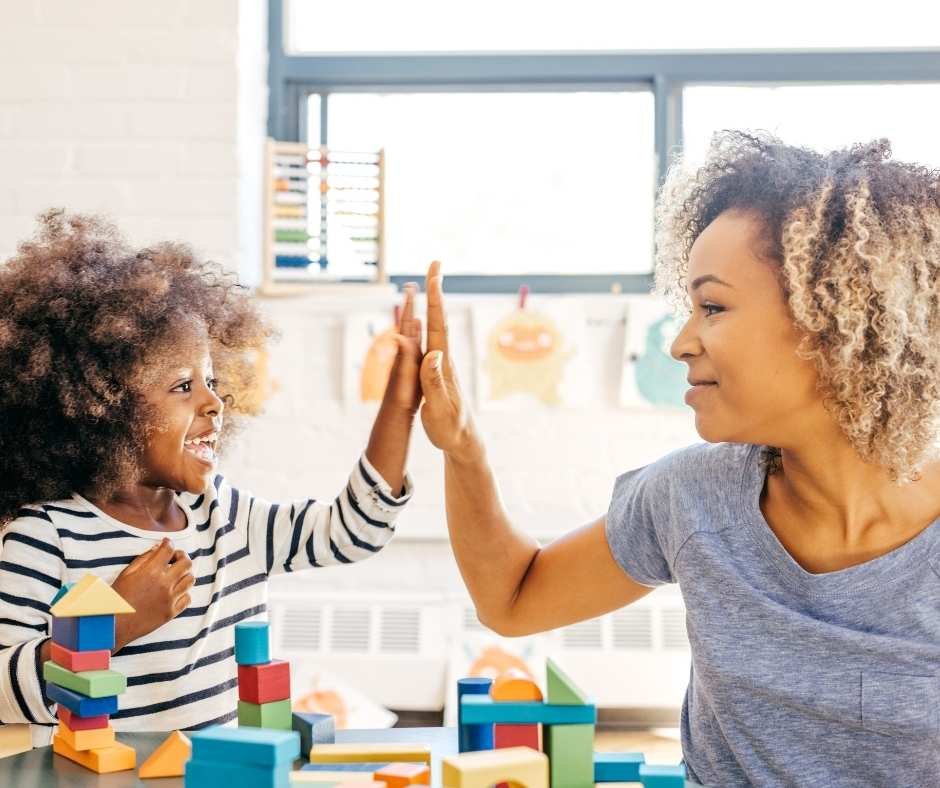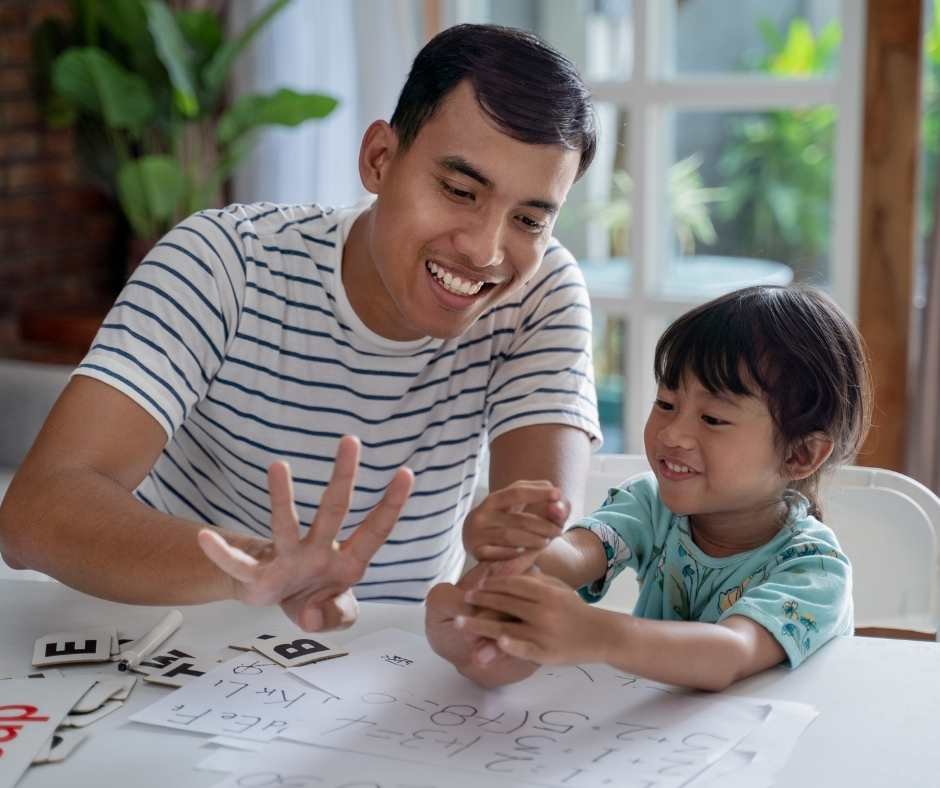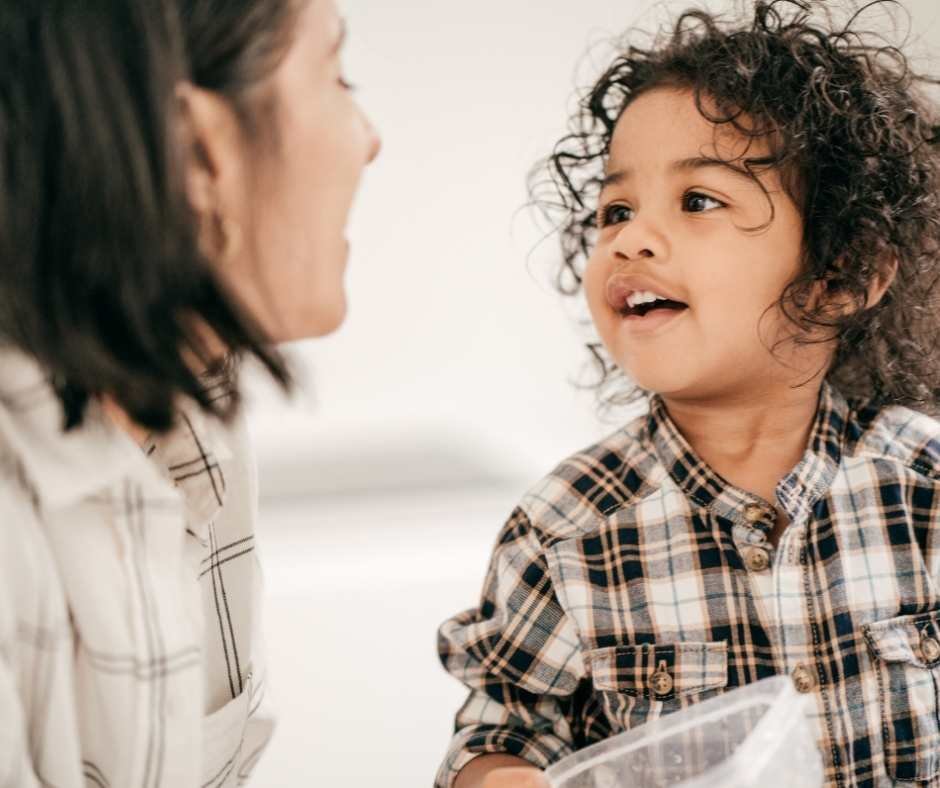Speech Therapy For a 3-Year-Old: How To Get Started
Are you wondering if your 3-year-old might benefit from speech therapy? There are many reasons a child between 36 and 48 months needs speech therapy. Maybe your child only has a few words, and you want them to be able to say more. Or maybe your child has many words, but you're concerned about their pronunciation. Your child's doctor may have even told you that they think your child would benefit from speech therapy because there is a concern for a speech or language delay.
Whatever the reason you want to help your child, there are some things you should know before getting started with speech therapy. This article will share tips on finding the right speech therapist and starting treatment. We'll also answer some common questions about speech therapy for 3-year-olds.
3-Year-Old Speech and Language Milestones
What Does Speech Therapy For a 3-Year-Old Look Like?
How To Get Started With Speech Therapy For a 3-Year-Old
How Can a Speech Pathologist Help Your Child Develop Language and Speech?
10 Speech-Language Therapy Ideas For 3-Year-Olds At Home
Frequently Asked Questions About Speech Therapy For 3-Year-Olds
3-Year-Old Speech and Language Milestones
Before we dive into how to get started with speech therapy, let's review some common 3-year-old speech and language milestones.
By understanding what is developmentally appropriate for your child's age, you can better determine if they would benefit from therapy. Remember that this is only a guide, and every child develops differently.
First, let's define some terms:
Speech is the actual production of sounds to form words.
Language is the system we use to communicate. It includes understanding words (receptive language) and using words to express our needs and wants (expressive language).
Now that we've defined some terms let's look at common speech and language milestones typically achieved by 36 months.
Expressive Language Milestones
Says between 250 and 1000 words
Understood by familiar people about 75% of the time
Puts three or more words together to make a simple sentence
Uses a variety of pronouns, such as "I," "me," "you," and "we," correctly when talking
Names common objects
Answers simple questions such as "what color is this?" "where are your shoes?"
Uses past tense -ed verbs, for example, "walked" and "biked."
Verbally expresses emotions, for example, "happy," "sad," and "mad."
Holds a basic conversation
Receptive Language Milestones
Follows simple two to three-step directions such as "Bring me the book and sit down" or "Walk to the door, say hello, and wave."
Understands adjectives such as "big" and "little."
Can answer basic questions such as "What color is this"? Points to common body parts when asked.
Can listen to a 10-15 minute long simple story and answer questions about it.
If your 3-year-old is not meeting these developmental milestones, they may benefit from speech therapy. It's always best to consult with your child's pediatrician or a certified speech-language pathologist (SLP) if unsure.
What Does Speech Therapy For a 3-Year-Old Look Like?
Now that you know some common speech and language milestones for 3-year-olds, let's discuss what speech therapy looks like for this age group.
Speech therapy sessions usually last 30-60 minutes, and the number of sessions per week will depend on your child's individual needs.
In general, younger children (3-5 years old) may need more frequent sessions (2-3 times per week) than older children (6 years and up), who may only need therapy once a week.
Speech therapy for 3-year-olds is usually conducted playfully, as this is how young children learn best.
Therapy may involve both structured and unstructured activities. Structured activities are planned out in advance by the therapist and are usually more focused on specific goals. Unstructured activities are less planned and more open-ended, allowing for more natural communication.
Both activities are essential in helping your child reach their speech and language goals. Some examples of structured and unstructured activities that may be used in therapy include:
Structured Activities:
Flashcard games
Book reading
Repetition exercises
Motor planning activities
Unstructured Activities:
Free play
Pretend play
Conversations
Songs and nursery rhymes
As you can see, speech therapy for 3-year-olds is usually conducted in a fun and interactive way to keep your child engaged in the activities and make learning new skills more enjoyable.
How To Get Started With Speech Therapy For a 3-Year-Old
If you think your 3-year-old may benefit from speech therapy, the first step is to consult with your pediatrician.
Your child's doctor can conduct a developmental screening to check for any delays or disorders and then make a referral to a certified SLP if necessary.
During the speech and language evaluation, the speech pathologist will assess your child's current level of functioning and develop a treatment plan tailored to their individual needs.
How Can a Speech Pathologist Help Your Child Develop Language and Speech?
Working with a speech pathologist is one of the best ways to help your child learn, remember, and use new words and phrases. Your speech therapist can teach you to model correct language use and how to expand your child's language abilities.
Parent coaching provided by a speech pathologist is often used to teach speech and language skills to children 36-48 months.
Some 3-year-olds may also need help learning to make specific speech sounds. Speech therapy is delivered through sound production activities, such as saying tongue twisters or making silly faces. Articulation games are also a great way to practice specific sounds. Your speech pathologist can teach you how to help your 3-year-old move from gestures and sounds to actual words.
A speech therapist can show you what most motivates your child regarding vocabulary and language development.
Reading and writing are essential literacy skills that your child can start to develop at three years old. Reading skills are important for three-year-old children as they move into pre-kindergarten and eventually grade school.
A speech pathologist can work on developing your child's phonological awareness, which is the ability to hear and manipulate individual sounds in words. Teaching phonological awareness includes being able to identify rhyming words and break words down into syllables.
You can encourage these skills by reading stories together, writing down simple words and phrases, and playing letter recognition games.
These are just a few examples of the types of services that a speech therapist may offer. Speech therapy can make a big difference in your child's life by helping them develop the skills they need to communicate effectively. With the proper support, your child can reach their full potential.
10 Speech-Language Therapy Ideas For 3-Year-Olds At Home
As a parent, you may wonder how to help your 3-year-old child with speech-language therapy at home. With a bit of creativity, there are many things you can do! Here are some great ideas to get you started.
Use Songs and Rhymes
Songs and rhymes are a great way to engage your child in speech-language therapy at home. Make up new words and songs using your child's name. Singing with your child can help with memory, attention, and following directions. Plus, singing and rhyming are just plain fun!
Examples of songs that encourage language are The Itsy Bitsy Spider, Wheels on the Bus, and Old McDonald Had a Farm. Try to find songs that are interactive and involve movement. The interaction with your child while singing will help keep your child's attention while also allowing them to burn some energy.
Turn Chores into Games
Turning everyday tasks into games is a great way to work on speech-language goals and get things done around the house.
For instance, you can turn setting the table into a matching game by saying the name of each item as you put it in its place.
When getting dressed, name the clothing items. For example, "First, we'll put on your shirt. Then, we'll put on your pants."
Or, you can work on following directions by giving your child one-step instructions to complete a simple task, such as "Please put your shoes away." As your child gets better at following directions, you can increase the complexity by adding more steps.
When cooking, describe what you're doing. For example, "I'm chopping the carrots into small pieces."
When cleaning up, name the items you're putting away. For example, "Please put the blocks in the box."
Create a Communication-Friendly Environment
One way to encourage your child's communication development is to create a communication-friendly environment at home. You want to provide ample opportunity for conversation and visual aids to help with understanding.
Try to make sure there are plenty of things around the house for your child to point to and name. You can also use picture books, magazines, and other print materials to help stimulate conversation.
Play Games with Your Child
Games are another great way to engage your child in speech-language therapy at home. Games can help with social skills, following directions, turn-taking, and vocabulary development.
Many familiar children's games can be easily adapted for speech-language therapy purposes. Examples of games include:
Simon Says – This classic game is great for following directions and listening skills.
I Spy – This game can be played with any object and is a great way to work on vocabulary development.
Do as I Do – This game is perfect for imitating actions and sounds. It's also a great way to practice turn-taking.
Red Light, Green Light – This game is great for following directions and listening skills. It can also be modified to work on other speech-language goals.
Play with Your Child's Favorite Toys
Toys are a great way to have fun with your child while helping develop their speech and language skills. Use toys that encourage your child to imitate sounds, words, and phrases.
Puppets are a great way to engage your child in speech-language therapy at home. They can help with turn-taking, following directions, and expressive language skills. Puppet shows are also a great way to encourage your child to use their imagination.
Make it a Family Affair
One of the best ways to help your child with speech-language therapy at home is to make it a family affair. Enlist the help of siblings, grandparents, and other relatives. The more people involved, the better!
During family play, enhance your child's language skills by taking turns and making up rules for different games as you go.
Visit the Library
Visiting the library is a great way to work on speech-language therapy at home. The library is a treasure trove of books, games, and DVDs designed to help with speech and language development.
The library is also a great place to find ideas for other activities you can do at home. As you travel to the library, point to and name different items you see.
Many libraries also have story times and other events for children. These are great opportunities to work on social skills and listening comprehension.
Take Advantage of Technology
Several great apps and websites can help with speech-language therapy at home. Many of these are free or have free trials.
Some great apps for speech-language therapy include:
Articulation Station: This app is excellent for working on articulation skills.
Language Builder Cards: This app is perfect for working on vocabulary development.
First Then Visual Schedule: This app is great for visual learners and can help with following directions.
Speech Blubs: This app is an excellent tool for various speech-language goals.
Several websites offer printable worksheets and other resources for speech-language therapy. Some of our favorites include:
Speech And Language Kids
Super Duper Handy Handouts
Make Take & Teach
Mayer-Johnson Boardmaker Online
Read Together Every Day
Reading books can help improve a child's speech skills at home. Reading can help with attention, comprehension, phonological awareness, and storytelling skills.
When selecting books for speech-language therapy, look for books with repetitive phrases or text, simple plots, and bright illustrations. When reading stories, point to the pictures and name the objects.
Some of our favorite books for 3-year-olds include:
The Very Hungry Caterpillar by Eric Carle
Make Way for Ducklings by Robert McCloskey
Corduroy by Don Freeman
Brown Bear, Brown Bear, What Do You See? By Bill Martin Jr. and Eric Carle
Chicka Chicka Boom Boom by Bill Martin Jr. and John Archambault
Do Arts and Crafts Activities Together
Arts and crafts activities are a great way to engage your child in speech-language therapy at home. They can help with following directions, turn-taking, and fine motor skills. Many resources are available online for arts and crafts projects designed explicitly for speech-language therapy.
When selecting arts and crafts activities for speech-language therapy, look for open-ended activities that you can do in many different ways.
Imaginary Play
Imaginary play is an excellent way to help your child practice new speech and language skills. When playing make-believe, your child can practice using new words and phrases. Imaginary play can also help turn-taking, following rules, and problem-solving skills.
Some great ideas for imaginary play include:
Pretend to be animals
Have a tea party
Play store or restaurant
Visit the doctor
Puppet Shows
Frequently Asked Questions About Speech Therapy For 3-Year-Olds
1. Can speech therapy for a 3-year-old be done virtually?
Yes, many speech-language pathologists (SLPs) offer virtual therapy. Virtual therapy provides many of the same benefits as in-person therapy and can be done from the comfort of your home.
The parent coaching model, where an SLP provides guidance and support to parents working with their child at home, is well-suited for online delivery.
2. Is it too early to start speech therapy for a 3-year-old?
No, it is never too early to start speech therapy. If you are concerned about your child's speech or language development, consulting with a licensed SLP is best.
3. Can a 3-year-old be a late talker?
Yes, a 3-year-old can be a late-talker. Late talking can be caused by various things, such as hearing loss, developmental delay, speech disorders, or being a late bloomer.
If you're concerned that your child is not meeting language milestones, it's best to have them evaluated by a speech therapist. Early intervention can correct late talking, so getting help is essential if you think there might be a problem.
4 How do I know if my 3-year-old has a speech or language delay?
There are a few ways to tell if your 3-year-old has a language or speech delay. If your child has trouble pronouncing words correctly, understanding what other people are saying, or communicating their needs, they may have a delay.
If you're concerned that your child has a speech or language delay, it's best to consult with a licensed SLP. They will be able to assess your child's skills, identify factors that can affect speech development, and provide guidance on the next steps.
How Connected Speech Pathology Can Help
Connected Speech Pathology offers speech therapy services for 3-year-olds. We provide parent coaching to help you support your child's development at home.
Connected Speech Pathology's therapists are experienced in working with 3-year-olds with speech and language delays. We will work with you to develop a treatment plan tailored to your child's needs. Our therapists' backgrounds and experience allow us to provide high-quality, evidence-based therapy that is effective and fun.
If you're interested in speech therapy for your 3-year-old, contact us today to schedule a free consultation. We would be happy to answer any questions.
About the Author
Allison Geller is a communication coach, speech-language pathologist, and founder of Connected Speech Pathology, an international online practice providing professional communication coaching and speech therapy for children, teens, and adults. With more than two decades of experience, she has worked in medical and educational settings, published research on aphasia, and leads a team of specialists helping clients improve skills in public speaking, vocal presence, accent clarity, articulation, language, fluency, and interpersonal communication.









